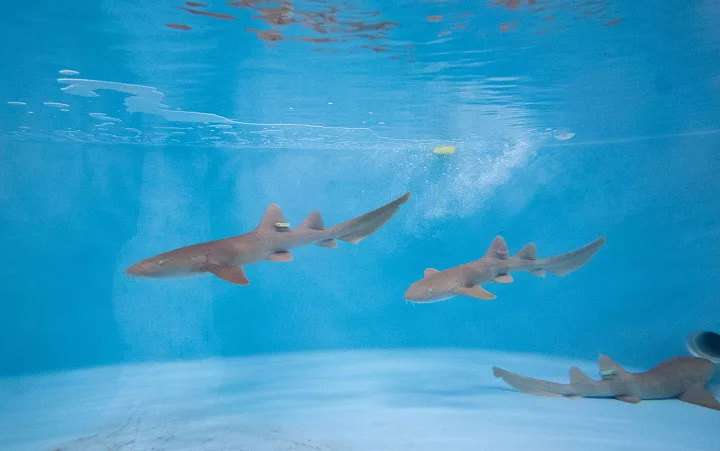Study examines text messages as method for successful weight loss
Enrollment to open for an interactive study aims to help people build habits for a healthier lifestyle, lose weight and keep it off.
There are some new residents on the University of Wisconsin–Madison campus, but they aren’t students, they’re sharks.
Though it might be easy to picture a scene out of “Jaws,” these sharks have arrived to help humans, not hunt them. In fact, the sharks will be integral to research focused on therapies for diseases such as cancer.
In 2021, the UW Carbone Cancer Center was able to provide the necessary equipment, including the shark tank, for new UW Carbone faculty member Dr. Aaron LeBeau, an associate professor of pathology and lab medicine, and radiology, at the UW School of Medicine and Public Health. He will be leading the shark-based cancer research, which is currently the only research of its kind worldwide.
“I’m really looking forward to working with these animals long term,” LeBeau said. “Sharks are widely misunderstood. A lot of people are scared of sharks, yet still fascinated by them. Our sharks are friendly and curious! They are excited to see us and love to play with us. I anticipate many fascinating discoveries in the years to come based on my recent research.”
He and his colleagues are currently investigating if and how tiny proteins called Variable New Antigen Receptors or VNARs can be used to treat devastating cancers such as breast, colon, pancreatic and prostate cancers. One particularly useful characteristic of VNARs, which are part of the adaptive immune system of sharks, is that they can be engineered to recognize any target of interest whether that target is a virus, bacteria or a cancer cell.
VNARs are responsible for binding to foreign antigens that are then removed by shark immune cells, according to LeBeau. They are exceptionally small proteins, which enables them to adopt many different positions in a small space.
“Their small size and unique geometries should also allow VNARs to access tumor cells in complex environments such as the bone,” he said.
The researchers are working with four juvenile nurse sharks, which are about the size of a badger. They have their blood drawn every other month or so, other than that they live comfortable lives swimming around and eating fresh seafood, according to LeBeau.

In the Department of Radiology, LeBeau and his team are currently investigating the use of these VNARs for nuclear imaging to more accurately detect metastatic cancer and to monitor for disease recurrence. They are also exploring the use of VNARs as cancer therapeutics.
“The shark immune system is efficient in its simplicity and is one of the earliest known immune systems in existence, predating ours by hundreds of millions of years,” he said. “So, what we are trying to do is harness the weird properties of VNARs to create agents that recognize and bind tightly to cancer cells, which could lead to better methods of detection and destruction of the cancer cells.”
These studies are the latest chapter in LeBeau’s unusual book of work. When he was working in Minnesota in 2019, he investigated how antibodies found in animals like llamas and alpacas could be used to identify and target prostate cancer cells in the body.
Other marine animals such as sharks, skates and rays have similar antibody structures to llamas and alpacas so LeBeau suspected they could someday play a role in cancer research as well. He started to work with very large sharks at a public aquarium, but soon came to realize he needed smaller subjects he could work with more closely. He began his search for the right place for a shark tank and found his home at the University of Wisconsin—Madison with the help of UW Carbone.
While LeBeau’s research focus has always been cancer, he recently shifted to COVID-19 amid the ongoing pandemic in collaboration with Elasmogen, a Scottish biotechnology company focused on creating VNAR-based drugs.
Their findings were remarkable, according to LeBeau. VNARs derived from the immune systems of sharks can prevent the virus that causes COVID-19, its variants and related coronaviruses from infecting human cells. The new VNARs will not be immediately available as a treatment in people, but they can help prepare for future coronavirus outbreaks. Based on their findings, Dr. LeBeau said it is possible that some of the new VNARs could be broad-spectrum coronavirus treatments because they bind to a small area that a lot of coronaviruses share. This study was the first of its kind to show that VNARs could be used to treat an infectious disease highlighting the diverse utility of VNARs.
“I thoroughly believe that VNARs have the potential to revolutionize how cancer is imaged and treated,” he said.
This work was made possible thanks in part to funds raised by the Andy North & Friends initiative and UW Carbone Innovation Fund members.
“My ultimate goal at the end of the day is to give hope to those who have no hope,” LeBeau said. “I am immensely grateful to the university, UW Carbone, and philanthropic support for allowing me to pursue this game changing research.”